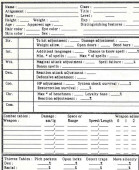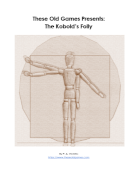Title: Farscape Roleplaying Game
Design: Ken Carpenter, Rob Vaux, Keith R. A. DeCandido, Gavin Downing, Lee Hammock, Kelly Hill, Christina Kamnikar
Rule Set: d20
Year: 2002
Pages: 320
Number of players: 2 or more
Rating: ★★
The TV show Farscape ran from 1999 to 2003 and was followed up by a 2 episode mini-series called The Peacekeeper War. The Roleplaying Game was released in 2002, which would have been in between Seasons 3 and 4. For this reason, the book only covers the first 2 seasons or so of action.
This is an interesting RPG as it tops out at 320 pages, which is one more than the
Star Wars RPG which was produced by WotC. What is interesting about this is, WotC managed to cram 4 movies worth of information into a book 1 page shorter than the Farscape RPg as a stand alone work while The Farscape Roleplaying Game assumes ownership of The Players Handbook. Farscape was published sometime in 2002, which makes this The Player's Handbook the 3.0 edition. Maybe? In June of 2003, the
3.5 edition came out. If you did not play D&D, you wouldn't even know.
The results are rather interesting. As is the rest of the book. If I reviewed the first 144 pages, this would be a 5 star review. This section of the book is a recap of everything in the series to that point, plus a short story called 10 Little Indians. The layout is incredible, the information is dense, and it really captures the essence of Farscape.
However, this isn't that review. One of the stand out features of this book is the artwork, which is entirely from the show. All of it is great and it is laid out
exactly like a product in this universe would be laid out. Titles appear in a machine-like flowing script which is readable with the proper skill (DC 30). Second, the margins are thick while the columns are
diagonal. It's cute for the first 144 pages, but when you actually need information, it's really hard on the eyes. Like MySpace banner hard.
From page 145 on are the rules. Remember that disclaimer about needing the Player's Handbook? Yeah... I'm not so sure. Which is a good thing because I can't tell if this means 3.0 or the 3.5 edition. I think the 3.0 edition, but it doesn't seem that necessary. If you missed that caveat, you could probably play this game not realizing something was missing. It isn't that it's missing words or that the grammar is odd, it's the layout of the book that jams your comprehension. It's just that distracting.
Like The Player's Handbook, you pick a race, a class, generate stats, select feats, skills and powers, then select equipment. All of that works well, it's a proven method utilized by many products in the d20 line. And that is where it gets weird. I can't point to a single thing that would require another book, which is probably my gamer hack-it ethic running wild. It sure seems odd.
February 16th edit:
I see it! This book is missing two parts for running a home campaign. First, it doesn't have the Experience chart. Second, it doesn't explain CR. Really? Because those two omissions actual require two books, not one. You kind of need the DMG and the PHB.
But not really, which sort of BS. The information missing from the experience chart is in the d20 SRD. Like the one on Hypertext d20 SRD, which is an excellent site. I give it 5 of 5 stars for helpfulness. You'll also need a challenge rating calculator if you want your players going against monsters. Or Critters as John would call them. Again, Hypertext d20 SRD to the rescue.
I am not sure why I didn't see this at first. It could be that edit blindness everyone gets when looking for extraneous words and typos. Or more likely, I couldn't see it because I would want my players to be the cast of the show. Be the heroes, which makes the experience chart unnecessary.
I feel the missing Challenge Rating is actually in universe. The heroes throw in against anything they can, anyway they can. Crackers and Nuclear Weapons are both combat items in this show. CR was never a factor when it came to putting the heroes in the action grinder.
After finding these two omissions, I would suggest one other change for the at home game. Use Vitality and Wounds. Farscape has simply relabeled Hit Points as wounds. Zero wound points is out cold, -10 is death. The WofC Star Wars RPG (click for that review) used Vitality and Wounds, which I feel is more cinematic. Vitality is how much punching around you can take, while wounds are limited to taking serious a blaster shot. One will knock you low for a day while the other one ruins your year. Also, considering how Control Points are used to activate powers, this game has more in common with Star Wars' Force Points than D&D spells or spell like powers.
Back to your review, as it was written back in January of 2020.
One of the flaws in the book is, being a recap of season 1 and 2, who and what the characters are not presented in a way that plays out in the TV show. Primarily, this shows up in the pregenerated characters. John is not particularly strong or smart according to his stats, which doesn't really fit with being a physicist and astronaut. On the other hand, all of the characters do seem to be balanced when only that group is considered. However, they are all rather high level, which you would think would lead to much higher stats.
Scorpius is listing as having a 9 strength, while D'Argo has an 18 which is not quite right. I would buy the 9 for Scorpius if he had some sort of Rage feat that allowed him to overpower other, stronger characters for a short period of time. He is a man with an actual cooling system, after all.
All and all, the book seems incomplete even when paired with the PHB and some that feeling is definitely problems caused by the layout.
At $9.99 at DriveThruRPG, I'd say it's for fans of the series or a person who wants a great coffee table RPG book. It is stunning to look at. Literally.
Two stars... only because I love Farscape.



![GM's Maps Post-Apocalyptic and Dystopian Bundle [BUNDLE] GM's Maps Post-Apocalyptic and Dystopian Bundle [BUNDLE]](https://www.drivethrurpg.com/images/3429/267734-thumb140.jpg)






![City of Nexus | 20x30 Battlemaps [BUNDLE] City of Nexus | 20x30 Battlemaps [BUNDLE]](https://www.drivethrurpg.com/images/12792/297531-thumb140.jpg)






